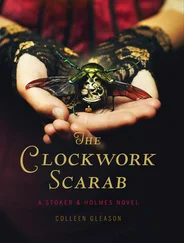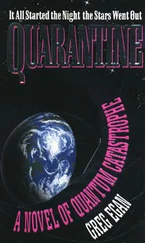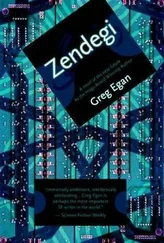Greg Egan - The Clockwork Rocket
Здесь есть возможность читать онлайн «Greg Egan - The Clockwork Rocket» весь текст электронной книги совершенно бесплатно (целиком полную версию без сокращений). В некоторых случаях можно слушать аудио, скачать через торрент в формате fb2 и присутствует краткое содержание. Жанр: Фантастика и фэнтези, на английском языке. Описание произведения, (предисловие) а так же отзывы посетителей доступны на портале библиотеки ЛибКат.
- Название:The Clockwork Rocket
- Автор:
- Жанр:
- Год:неизвестен
- ISBN:нет данных
- Рейтинг книги:3 / 5. Голосов: 1
-
Избранное:Добавить в избранное
- Отзывы:
-
Ваша оценка:
- 60
- 1
- 2
- 3
- 4
- 5
The Clockwork Rocket: краткое содержание, описание и аннотация
Предлагаем к чтению аннотацию, описание, краткое содержание или предисловие (зависит от того, что написал сам автор книги «The Clockwork Rocket»). Если вы не нашли необходимую информацию о книге — напишите в комментариях, мы постараемся отыскать её.
The Clockwork Rocket — читать онлайн бесплатно полную книгу (весь текст) целиком
Ниже представлен текст книги, разбитый по страницам. Система сохранения места последней прочитанной страницы, позволяет с удобством читать онлайн бесплатно книгу «The Clockwork Rocket», без необходимости каждый раз заново искать на чём Вы остановились. Поставьте закладку, и сможете в любой момент перейти на страницу, на которой закончили чтение.
Интервал:
Закладка:
“But whatever the fine details,” Eusebio said, “so long as the cosmos is finite—and the light equation suggests that it must be—there’s a potential for the Hurtlers to be the harbinger of something worse.”
“ A potential . Exactly.” Yalda didn’t want him losing sight of that. “Admitting that there could be places in the cosmos where two sets of worlds cross paths with each other doesn’t mean that has to be what’s happening here and now.”
“Except that the alternative explanations for here and now aren’t working out too well,” Eusebio replied. “If the Hurtlers are just debris from a single monstrous explosion, shouldn’t the fragments be arriving ever more slowly?”
Yalda said, “Yes—but whether we could measure the change in velocity over just a few years is another question. It’s been tough enough quantifying the velocity at all.”
Eusebio was unpersuaded. “Why should the change be so hard to spot, though? I can imagine an exploding world sending out a blast of high-speed dust, along with a slower-moving barrage of pebbles. But if that really does explain everything, shouldn’t the difference in speed be as striking as the difference in size?”
“Perhaps,” Yalda admitted.
“My third-hand source implied that you’d more or less predicted this”—Eusebio gestured at the color trails crowding the sky—“almost two years ago. A cluster of worlds and stars, much like the one we seem to lie within ourselves, would be surrounded by a halo of fine dust. Then as you penetrated deeper into its environs you could expect to encounter larger objects.”
“It’s hard to know for sure what the structure would be,” Yalda said. “We don’t understand the breakup of worlds, let alone the long-term effects of gravity and collisions between the fragments.”
“But it’s not an unreasonable position ,” Eusebio persisted, “to posit rarefied dust at the edges and more substantial material closer in?”
“No.” However much she wished to downplay the conclusions, Yalda couldn’t retreat from the entire argument she’d made.
Eusebio said, “Then if our notion of time corresponded to one of this cluster’s notions of space … we should expect to find ourselves encountering successively larger objects, all moving at similar speeds. Isn’t that right?”
He offered an illustration.
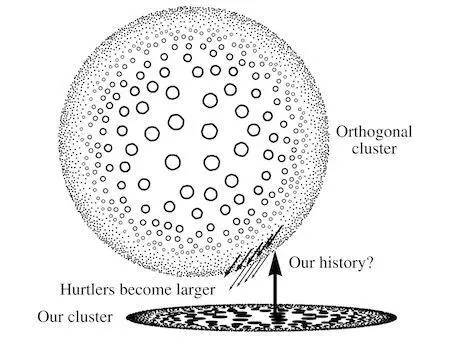
“Couldn’t you at least have us glancing the edge?” Yalda pleaded. “We don’t need to be heading in as deeply as you’ve drawn it.”
Eusebio obliged. “I knew I should have been a physicist,” he said. “If there’s something you don’t like about the world, you merely adjust a free parameter and everything’s perfect.”
“What would you have me do?” she said. “Give up hope for all of our grandchildren?”
“Not at all. I want you to imagine the worst, and then tell me how we can survive it.”
Yalda emitted a bitter, truncated buzz. “ The worst? The Hurtlers will keep coming, ever larger and in ever-greater numbers, until the odds that we’re struck approach a certainty. If we survive that, we’ll probably collide with an orthogonal clump of gas—turning the world itself into something like a giant Hurtler. Somewhere along the way, there will be gravitational disruption, maybe ripping us free from the sun completely—or maybe tossing us into it. And if none of these things sound sufficiently fearsome, the encounter might scramble our arrow of time completely, leaving us with no past and no future. The world will end as a lifeless mass of thermal fluctuations in a state of maximum entropy.”
Eusebio heard her out without flinching, without disputing anything. Then he said, “So how can we survive that?”
“We can’t,” Yalda said bluntly. She pointed to his chest. “If it’s more than a glancing blow—if you’re going to deny me my choice of impact parameter—then we’re all dead.”
“Are you telling me that it’s physically impossible to protect ourselves?”
“Physically impossible?” Yalda had never heard an engineer use that phrase before. “No, of course not. It’s not physically impossible that we could shield ourselves from all of these collisions, or side-step them, or simply flee from the whole encounter. It would violate no fundamental law of physics if we built some kind of magnificent engine that carried the whole world off to a safer place. But we don’t know how to do that. And we don’t have the time to learn.”
“How long would it take?” Eusebio asked calmly. “To learn what we need to know to make ourselves safe.”
Yalda had to admire his persistence. “I can’t honestly say. An era? An age? We still don’t know the simplest things about matter! What are its basic constituents? How do they rearrange themselves in chemical reactions? What holds them together and keeps them apart? How does matter create light, or absorb it? And you want us to build a shield against collisions at infinite velocity, or an engine that can move an entire world.”
Eusebio looked around at a group of students chatting happily near the food hall, as if they might have overheard this catalog of unsolved problems and decided to rise to the challenge.
“Suppose we’d need an age, then,” he said. “A dozen gross years. How long do we actually have before the danger becomes acute?”
“I can only guess.”
“Then guess,” Eusebio insisted.
“A few dozen years,” Yalda said. “The truth is, we’re blind to whatever’s coming; a whole world, a whole blazing orthogonal star might already be disposed to strike us tomorrow. But from the progression in the size of the Hurtlers that we’ve seen so far, unless we’re especially unlucky…” She trailed off. What difference did it make? Six years, a dozen, a gross? All she could do was go on living day by day, averting her gaze from the unknowable future.
Eusebio said, “We need an age, and we don’t have it.”
“Exactly.”
“That’s what I thought,” he said, “but I had to hear it from you to be sure.”
His tone was solemn but far from despairing. Yalda stopped walking and turned to face him. “I’m sorry I had no good news for you,” she said. “Perhaps I’m wrong about all of this. Perhaps our luck will be far better than—”
Eusebio raised a hand, cutting her off. “We need an age, and we don’t have it,” he repeated. “So we find the time elsewhere.”
He wiped the colliding clusters from his chest. Then he drew two lines, one straight, one meandering, and added a few simple annotations.
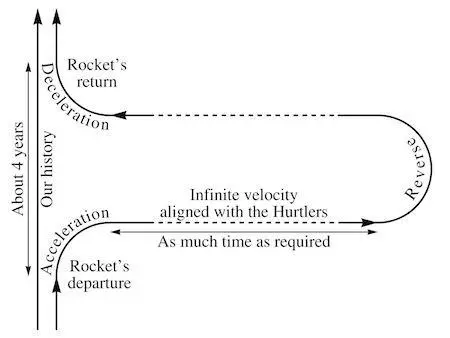
“We make a rocket,” he said, “powerful enough to leave the world behind. We send it into the void and accelerate it until it matches the velocity of the Hurtlers. Once it’s done that, there’ll be very little chance that anything from the orthogonal cluster will strike it—but we might need to offset its position at the start, to keep it from colliding with gas and dust in our own cluster.
“The complete journey is as I’ve drawn it. The time that passes for the world will be the time it takes to rotate the rocket’s history by a full turn: one quarter-turn to accelerate, one half-turn to reverse, one final quarter-turn to decelerate. If the rocket accelerates at one gravity—giving the passengers no more than their ordinary weight—the time back home for each quarter-turn will be about a year, making four years in all.
Читать дальшеИнтервал:
Закладка:
Похожие книги на «The Clockwork Rocket»
Представляем Вашему вниманию похожие книги на «The Clockwork Rocket» списком для выбора. Мы отобрали схожую по названию и смыслу литературу в надежде предоставить читателям больше вариантов отыскать новые, интересные, ещё непрочитанные произведения.
Обсуждение, отзывы о книге «The Clockwork Rocket» и просто собственные мнения читателей. Оставьте ваши комментарии, напишите, что Вы думаете о произведении, его смысле или главных героях. Укажите что конкретно понравилось, а что нет, и почему Вы так считаете.




